Good Reads/Good ViewsThere is a vast and ever-growing literature on the U.S. presidency. There are also helpful websites on the subject. While unable to review all useful resources, we describe many below and plan to add more from time to time. Happy Reading/Happy Viewing! BooksIf they are not in your nearest library, most of the books listed here should be available from the publisher or an online source such as Alibris.com or Amazon.com What a Rookie President Needs to Know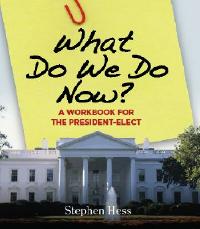 Stephen Hess, What Do We Do Now? A Workbook for the President-Elect. Washington: Brookings Institution Press, 2008. A presidential expert describes all the work that must be done between election of a new president and the presidential inauguration ten or eleven weeks later. Hess emphasizes pitfalls to avoid in choosing White House staff and cabinet members. He also suggests other helpful books on the subject. 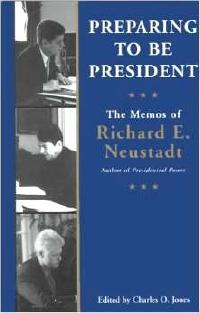 Richard E. Neustadt, Preparing to Be President: The Memos of Richard E. Neustadt, ed. by Charles O. Jones. Washington: AEI Press, 2000. Presents memos written by the late Harvard professor Richard Neustadt for President-Elect Kennedy and for associates of incoming presidents Reagan and Clinton. In an afterword, Neustadt suggested that "arrogance and innocence combined" can lead new administrations into trouble. He also noted that new presidential aides often fail to learn valuable lessons from outgoing White House staff who are eager to help them. 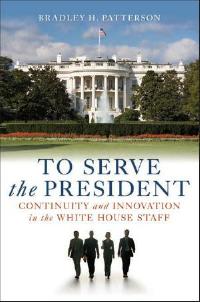 Bradley H. Patterson, To Serve the President: Continuity and Innovation in the White House Staff. Washington: Brookings Institution Press, 2008. A gold mine of information on how the White House works, written by a veteran of three presidential staffs. Patterson explains how an enlarged White House staff advanced presidential policies during the George W. Bush administration. He also deals with policy and power conflicts between White House staff and cabinet members. This is a must-read for understanding today's presidency. 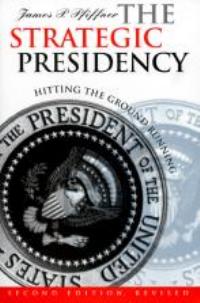 James P. Pfiffner, The Strategic Presidency: Hitting the Ground Running. Lawrence, Kan.: University Press of Kansas, 1996, 2nd ed. rev. A leading expert on the presidency explains the transition between election and inauguration. Pfiffner uses examples from President Dwight Eisenhower through the first term of President Bill Clinton to show good and poor decisions on appointees and policy launches. Pfiffner says that direct contact "between the president and cabinet members is the most effective way to keep the White House staff on tap rather than on top." Other Good ReadsNancy Gibbs and Michael Duffy, The Presidents Club. New York: Simon and Schuster, 2012. A fascinating account of the ways former presidents help--and sometimes hinder--current ones. Herbert Hoover helped Harry Truman with humanitarian aid to Europe after World War II and with government reform. Jimmy Carter defused dangerous situations for two successors through his diplomacy, but ruffled some presidential feathers along the way. George H. W. Bush and Bill Clinton worked together on relief efforts abroad. The book explains both personality conflicts and successful efforts to overcome old grudges. 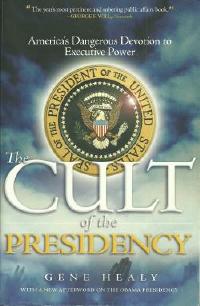 Gene Healy, The Cult of the Presidency: America's Dangerous Devotion to Executive Power. Washington: Cato Institute, 2009 (paperback reprint of 2008 edition, with an afterword). Healy traces the growth of presidential power over the past 100 years. Both the public and many presidents, he suggests, have expected far too much of the office. He says this has led to power grabs that have endangered our civil liberties and enabled wars. Today's presidency, he contends, "cannot deliver what it promises; and in the promising it sets the stage for further concentration of power." John R. MacArthur, You Can't Be President: The Outrageous Barriers to Democracy in America. Brooklyn, N.Y.: Melville House, 2008. Harper's Magazine publisher John MacArthur challenges the idea that any American can become president. Writing from the left, he stresses that wealthy campaign donors and the "two-party monopoly" have enormous power over our politics. He does, though, find some hope in citizen action at the local level. He wrote the book "to help thaw what has become an American political ice age." 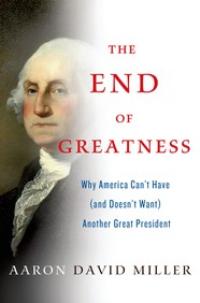 Aaron David Miller, The End of Greatness: Why America Can't Have (and Doesn't Want) Another Great President. New York: Palgrave Macmillan/St. Martin's Press, 2014. Miller suggests that great presidents usually appear only in times of major crisis. He believes that Americans expect too much of their presidents, that "the job is just too big and expectations too high." He says we should look for good presidents rather than great ones. Miller adds that, "given the troubled history of the modern presidency, undeniably good presidents are not that easy to come by; it's still a high expectation to meet." Richard E. Neustadt, Presidential Power and the Modern Presidents: The Politics of Leadership from Roosevelt to Reagan. New York: Free Press/Macmillan, 1990, 3rd ed., rev. Prof. Neustadt, who had enormous influence on other presidential scholars, explored in this book how various presidents used power skillfully or poorly. Stressing the need for them to ask many questions, he said that a president "can count on no one else to do his thinking for him." Richard E. Neustadt and Ernest R. May, Thinking in Time: The Uses of History for Decision-Makers (New York: Free Press/Macmillan, 1986). The late Harvard professors taught a course on this book's subject because "we sensed around us--in our classes, in the media, in Washington--a host of people who did not know any history to speak of...who thought the world was new and all its problems fresh." In the book, they use case studies of success and failure to suggest how presidents and other officials can make better use of history in their decisions. George E. Reedy, The Twilight of the Presidency. New York and Cleveland: New American Library and World Publishing Co., 1970. The late Mr. Reedy was press secretary to President Lyndon B. Johnson. He suggested that presidents are so isolated from normal human life, so catered to and spoiled by White House staff, that they lose the sharp political instincts they need to be effective. He said that President Franklin Roosevelt "was a remarkable man who learned even from his own mistakes," but that few other presidents have done that. George E. Reedy, The Presidency in Flux. New York: Columbia University Press, 1973. Reedy contended that Lyndon Johnson was extremely effective as Senate Majority Leader partly because he "was in very close touch with political reality" from his daily talks with other senators, but that he lost that close contact after moving to the White House. "The problem is to somehow establish peers for the President," Reedy suggested. Robert B. Reich, Locked in the Cabinet. New York: Alfred A. Knopf, 1997; Vintage Books, 1998. Reich offers a lively account of his four years as Secretary of Labor under President Bill Clinton. He describes frustration in dealing with Clinton and other administration figures. He also offers entertaining translations of Washington-speak. When the feisty chair of the House Education and Labor Committee said that he looked forward to working with Reich, Reich heard it this way: "I'm going to watch you very, very carefully, Mr. Secretary.... You and your boss have a long way to go. I hope you know that I can eat you for lunch any day I want." Robert Schlesinger, White House Ghosts: Presidents and Their Speechwriters. New York: Simon & Schuster, 2008. Based on research in presidential libraries and interviews with former White House speechwriters, this book gives a valuable history of speechwriting for Presidents Franklin Roosevelt through George W. Bush. Generally, the earlier presidents fare better in Schlesinger's account. Some recent presidents have had too many speechwriters, have not given them enough guidance, and/or have allowed too much meddling by other White House staff. Arthur Bernon Tourtellot, The Presidents on the Presidency. Garden City, N.Y.: Doubleday & Co., 1964. This book offers an abundance of quotations from Presidents George Washington through John Kennedy. A section on "The Burdens and Privileges of the Presidency" reveals that many found the burdens very heavy indeed. But not Teddy Roosevelt! He declared: "No President ever enjoyed himself in the Presidency as much as I did..." Journals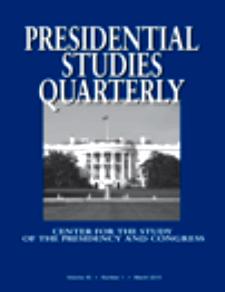 Presidential Studies Quarterly: Describes itself as "the only scholarly journal that focuses entirely on the most powerful political figure in the world--the President of the United States." Articles have included "What's So Sinister about Presidential Signing Statements?"; "The President, the Fed, and the Financial Crisis"; and "The Rise of Sunbelt Governors: Conservative Outsiders in the White House." Published by the Center for the Study of the Presidency & Congress, which is listed below. WebsitesAmerican Presidency Project Offers a huge archive of documents of and about the U.S. presidents--party platforms, speeches, press conferences, and more. The media section includes audios (and some links to YouTube videos) of speeches from Franklin Roosevelt through Barack Obama. American President: Provides presidential speeches in text form. Also presents secretly-recorded presidential conversations from Franklin Roosevelt through Richard Nixon. (Note: Some early ones are hard to hear.) In addition, the site offers transcripts of many oral-history interviews with former White House staff. Ballotpedia Offers comprehensive coverage of U.S. politics, including presidential elections; provides much info on presidential candidates' policy views. Center for the Study of the Tries to find how both branches of government can be more successful; publishes the Presidential Studies Quarterly and case studies of success and failure; also runs a Presidential Fellows program for undergraduate and graduate students from around the United States. My Journey through the Stephen Floyd, an investment banker in Virginia, is fascinated by U.S. presidents. He's on a marathon adventure of reading biographies of all of them. On this site, he offers reviews of books on George Washington through Harry Truman. He is now reading a stack of books about Dwight Eisenhower. Politico.com Covers national politics and the presidency, with both reporting and commentary. It gives much space to presidential campaigns, and its "Magazine" section offers some in-depth articles. There is also a Politico print edition, primarily for distribution in Washington, DC. Real Clear Politics Links to news reports, commentary, and polling data on politics; places much emphasis on presidential campaigns. (The site also links to articles on books, education, financial markets, history, military affairs, religion, science, and sports.) U.S. National Archives Offers links to a wealth of information on the presidents, including articles, essays, interviews with former presidential staff, documentaries, and websites. Also provides links to the presidential libraries of Herbert Hoover through George W. Bush. U.S. Presidential Election News Provides information on 2016 presidential primary and caucus schedules, candidates, presidential debates, and national party conventions. White House The official White House website offers information, photos, and videos on the current president's activities. It includes presidential speeches, press conferences and briefings, executive orders, and more. |